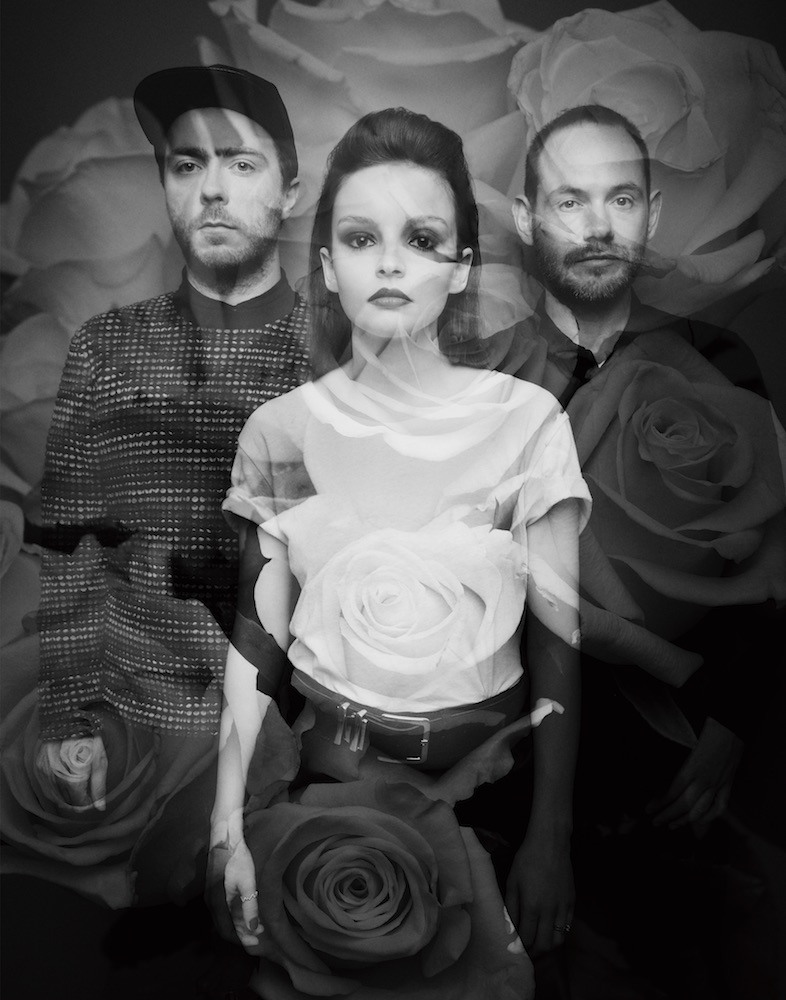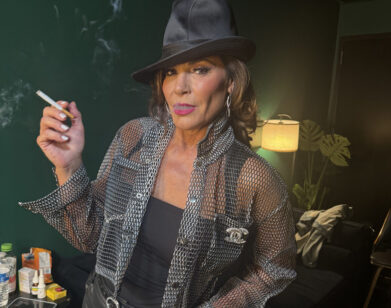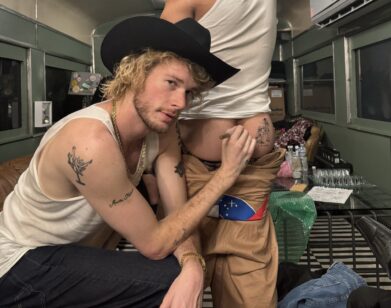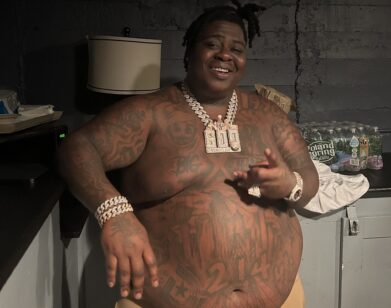Eyes Wide Open
CHVRCHES IN LONDON, AUGUST 2015. PHOTOS: MATT HOLYOAK/KAYTE ELLIS AGENCY. STYLING: VANISSA ANTONIOUS. MAKEUP: GINA BLONDELL AT FRANK AGENCY USING NARS COSMETICS. HAIR: JOHN MULLAN AT THE LONDON STYLE AGENCY USING FUDGE URBAN.
There’s often a stigma surrounding the release of a band’s sophomore record. Will it live up to the hype of the first? Will the sound go in a completely different direction? For Glasgow’s Chvrches, their second album, Every Open Eye, delivers electropop with a darker and more raw edge than their debut, The Bones of What You Believe. While the 2013 release included breakout hits “The Mother We Share” and “Recover,” the trio’s new LP, which was released on Friday, is a cohesive album filled with gorgeous harmonies that shine through upbeat melancholia.
Although the band found early success, the path hasn’t been all glory. Earlier this year, after Chvrches released the video for “Leave A Trace,” frontwoman Lauren Mayberry suffered extreme misogynistic cyberbullying—something she didn’t take lying down. Instead, she became an outspoken voice, turning her fame for musical talents into a rounded-out persona as a role model for other women facing inequality in the music industry.
Just before Every Open Eye‘s release, Sleater-Kinney’s Corin Tucker spoke with Mayberry about influential writers, how her relationship with creativity has changed over time, and dealing with sexism in the music industry—especially when it comes to interviews. —Ilana Kaplan
CORIN TUCKER: Congratulations on the new record. It’s so good. I’m so excited for you guys.
LAUREN MAYBERRY: Thank you. That’s very nice of you. I feel like I’ve been sitting on it forever, but also that this month is going so slowly.
TUCKER: It feels so good to actually have release day, doesn’t it?
MAYBERRY: I feel like you’ve released many more than me, but I don’t know—second album. People ask us in every single interview if you feel like there’s a lot of pressure. I feel like I’d explode from answering another question about pressure.
TUCKER: Sometimes you have to focus on the actual album itself.
MAYBERRY: When you guys put out the most recent record, it felt like it came out of nowhere. Was that purposeful?
TUCKER: We did try really hard to keep it a secret until we were ready. I think it helped us write something that was really unexpected. Sometimes it’s useful to have that element of people not knowing what you’re doing and not paying attention. Obviously you guys don’t really have that, but it seems like you kept it quiet while you were writing the record, a bit.
MAYBERRY: I think so. When we first started, the band and things started to pick up, people would always ask us, “When are you going to move to London?” To me, that doesn’t make a lot of sense because we self-record and self-produce, so we don’t need that for the long term. I quite like being removed from the industry stuff so that when we’re not on tour and we’re writing, we’re in a small room and you can’t get out physically. I like that mental checking-out aspect—I think it’s quite nice.
TUCKER: Of course. I think that makes perfect sense that you’d want to live in Glasgow. You seem like a Scottish band to me. Do you feel like a Scottish band?
MAYBERRY: I think when we leave the country we do. When we’re here, we don’t really think about it as much. We don’t feel it a lot in the U.K.; it’s when we go to North America a lot. A lot of people have Scottish heritages, so people ask about us there a lot more. Culturally, the States and U.K. are very similar, but there are certain things where it’s such a massive disconnect. My partner is American so we’re doing a cultural exchange—I feel like I’m always learning. Occasionally he adopts some Glasgow slang and it doesn’t sound right, but I like that he does it.
TUCKER: There are some things that are very different and we Americans tend to be very entitled when it comes to our way of speaking. I wanted to ask you, in terms of being a writer, who are your favorite writers or poets?
MAYBERRY: That’s a good question. No one has ever asked me that in an interview, ever. At the moment, I’m reading a lot of non-fiction. I’m not sure if it’s because I’ve been traveling a lot—it’s easier to pick up and put down non-fiction stuff. I’ve been re-reading the Jessica Valenti book, Full Frontal Feminism. I’ve been reading Between The World And Me by Ta-Nehisi Coates; I saw him on The Daily Show talking about it and immediately after that I had to order that book. Then The Daily Show ended, and I was very sad. I felt like I was weeping for a week.
Anne Carson and Angela Carter are folks I hold close to my heart because they have such unique ways of telling stories. I think in reading a few sentences of text you can just tell the tone, and that’s something I love in prose writers, but in lyricists as well. That’s how I feel about you guys: I always can tell with Sleater-Kinney’s melodies or lyrics that it’s yours.
TUCKER: What is your process like when you write lyrics? Do you write every day? Do you write music first? Do you have music or lyrics that come to you very easily?
MAYBERRY: I keep a notebook, so when I’m walking around or when we’re on tour, I’ll write down words or phrases. We tend to write the music first, with a nonsense folk melody. I feel like that would be a funny bonus release at some point—all the nonsense I write down. I have 400 Chvrches songs on my computer with me scat-singing and it’s like, “What is this?” It’s horrible. I remember at the start, there was a two-week period where I couldn’t get anything done. I would start writing something and then I’d be like, “I don’t like this.” It was two steps forward and one step back. I must have pushed to the ceiling at a certain point. Then, finally, the writing came really quickly, the record came thematically together, I hope. It just took ages to get started. I think I was over-thinking it.
TUCKER: I think you just described the writing process. I think that happens every time, like, “Ugh this is the worst thing ever.” You put it down, hate it, and come back to it. All of those different aspects are important, and I feel like they happen every time.
MAYBERRY: It makes me feel better that I’m not going insane. Writing with other people is the only way I ever really work. In some ways it’s great because it’s helpful to someone pull you out of that loop. I remember once accidentally saying out loud, “I feel like this song is a piece of shit.” Then I was like, “That’s a shame for the other two people who have been actively putting together this song.” It’s the nature of working with other people—you have good days and bad days. Sometimes you go into this black hole and it’s like, “If I don’t fix this one particular thing everything will fall apart.” Then it’s like, “Actually the world will not end if this happens.”
TUCKER: It’s good that they’re supportive of you. Even when you disagree, you have to have a level of respect to finish something. This is a dumb job-interview question, but where do you see yourself in 20 years? What kind of career would you want to have?
MAYBERRY: This is probably a terrible thing to say, but I feel really lucky most days. I blindly stumbled into doing this professionally. I’ve always been in bands, but I never felt like this would really happen for me. I was like, “I’ll work freelance so I can keep doing this.” It just didn’t seem like it was going to be a thing that happened for me, but I kept writing. It’s weird, four or five years later, to see that I’m doing this as a job. I used to go to this existential mind-bubble where I’m like, “This is not real.” I was just very confused by all of this. I did a lot of non-music writing previously, so I’d like to keep that going and keep music going. In my head, I’m like, “Would I want to be in a band in 20 years? I’m not sure.” I’m not really sure if your relationship with creativity changes over time. For me, it has.
TUCKER: I think that you’ve brought a lot of awareness and activism to people’s minds about sexism, online misogyny, and you seem to be a really natural leader and public speaker. Would you ever consider going into politics in the future?
MAYBERRY: Oh god. For me, I enjoy working with people. That seems simplistic, but whenever I’m distressed, angry, and want to feel like something can be done about something, it feels better when you surround yourself with people. I think I’d rather work with a grassroots organization than in politics. I’m not sure I’d be the best politician because I don’t think I’m good about tactfully tiptoeing around questions in the right way.
TUCKER: Maybe in 20 years we won’t need to tactfully tiptoe around things.
MAYBERRY: I did an interview today with a reasonably respected British journalist and he actually asked me in the interview, “Do you think you’d like to take some time out of music in the next few years to focus on your personal life? I don’t know if you have a partner but have you considered how you would juggle children with touring?” I had never been asked that question before. I was like, “Well that’s not really your business, pal.”
TUCKER: Do you think a male musician would ever be asked that question?
MAYBERRY: Well, I didn’t want to scream on the phone at him. In my head, I was like, “I’ll find a polite way of getting out of it.” I figured if I was like, “Dude that’s incredibly rude, condescending, and offensive,” then I’m going to get tired of [being] that person who does that all the time. It’s inevitable that people are going to find out about my natural, god-given feminist rage. People are like, “Why are you angry all the time?” It’s like, I’m not angry. I’d like to think I’m a reasonably nice person, but unfortunately when those conversations come up, it does make me angry. It should make people angry. I did wonder in the interview if this guy was real-life trolling me.
TUCKER: I agree. There are so many times that as a woman in the music industry you’re asked questions no male musician would ever be asked. For me being a mom and having two kids, I don’t think men who are fathers in bands are being asked the responsibility questions, about touring with kids—up until recently. Recently there has been a cultural shift with fathers being parents, and it’s totally crucial. I do think we have a long way to go in terms of the culture around women still being career women, and asking a woman about her career and her work, just seeing them as fully validated human beings in the workplace. It’s so important that you are speaking up about this because so many women experience it and don’t have a way to talk about it. It’s incredibly hurtful and really unacceptable. If we don’t speak up about it, how do we expect to change it? Do you think that people are more prone to hateful language online, when it is anonymous?
MAYBERRY: We’ve had a few things at shows, but nothing as extreme and as aggressive as we’ve had online. I think the anonymity factor really wraps it up. It’s a weird protection for people. It’s so risky, because how do you ever crack down on that without cracking down on free speech in general, which is incredibly important? A part of me thinks that Twitter and message boards are worse because of the anonymity factor. I have a personal Twitter for band purposes, but I don’t use social media a lot. I fall in a weird age gap. I was on band message boards when I was 16, but I was on the early curve of Facebook. I did it for work when I worked in media, and I did it for the band, but I can’t relate to the idea that you live your life online. Part of me feels like I don’t really get drawn into a negative way of thinking about it. For us, the Internet has been really amazing, and I think it’s a place of great passion, creativity, and knowledge. Seeing people communicate about the band online has been amazing, but I think a lot of people spend a lot of time talking about what they hate rather than what they love. I don’t want to get trapped in that.
TUCKER: You guys have such an amazing following from people who have heard you online. I feel like in some ways that’s the new generation of how people experience music. When I started playing music, it was all face-to-face. It wasn’t any less confrontational. It was charged with sexist problems. A lot of our early shows, there were some really angry confrontations, but there were some really beautiful moments too. Hopefully the beautiful moments outweigh the confrontations and the problems that we all have work out. Do you feel like it’s important to have different voices or take on an alter ego? Is that helpful to you as a writer?
MAYBERRY: I’ve never been able to write narrative as a character, really. Jenny Lewis, I love her stuff, I love that she can weave these American Gothic fairytales. I feel like I sound inauthentic when I do that, so I tend to write from a personal standpoint. I liked when I was doing this record that it sounded more assertive. It was like writing about a version of yourself, weirdly. When I was doing it, it helped process thoughts on something.
The new material will also definitely help with the performance aspect. I have found the performance of this band is more intimidating. I was in indie rock bands before, so I just needed to find a way to do this in a way where I felt comfortable. I think I found a more assertive character easier to get into on stage. I never know what to do with my limbs—just always flapping around. [laughs]
TUCKER: Well, it almost feels like on this record you’re spreading your wings a bit. Does it feel like that?
MAYBERRY: We felt more confident to try different things. Living in the band, day-in and day-out, during two years of touring, we had a better grasp of the band within. I remember having a conversation around Christmas time and someone said something about being a professional musician, and I was a little taken aback. I was like, “Oh, that is what I do now.” We never did anything we weren’t ready for, but I did feel like I was catching up with myself when we were playing gigs at tiny clubs and then huge venues. This time around, I wanted to feel like I was more in front of the ball. This is my reality now; I wanted to feel like I was coming out, swinging a bit.
TUCKER: It feels like you’re coming at it with strength and vulnerability. You kind of have a classic, romantic poet way of writing that I really enjoy. Do you feel like all of your different experiences are an important part of being a writer? Like, heartbreak?
MAYBERRY: At this point in life, I feel like, yes. There were times in my early 20s where I dealt with some anxiety and depression issues. At that time, it just feels like you’re under the water and you can’t get out. It’s weird to see now that all of those things added up to where I am today. It’s weird to be grateful for the growth that happens because of those experiences. I’d convinced myself that I’d written some sadder songs on the record, which is some of the darker stuff we’ve written, but it’s also some of the most hopeful. I’m making progress; you can feel it’s genuine. I hope that’s what people take away. I like the idea of a record being more than one thing emotionally—human beings go through so many emotions in one day, and I like those things sitting next to each other. Nobody is strong 100 percent of the time, or falling apart 100 percent of the time; sometimes you’re doing both at once. Hopefully, it all comes out in the music we make.
EVERY OPEN EYE IS OUT NOW. FOR MORE ON CHVRCHES, VISIT THE BAND’S WEBSITE.







